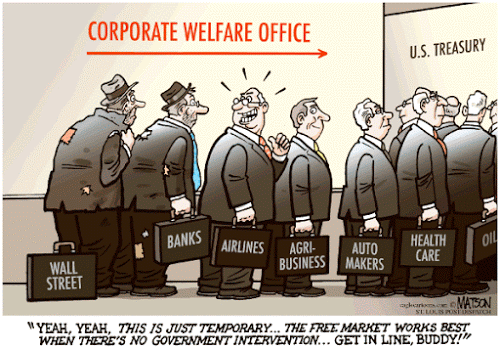In one respect, it’s true there’s an awful lot of hypocrisy about welfare from big business, since wasteful corporate welfare is pervasive in our societies. On the other hand, some aspects of business welfare are actually sensible and justifiable, even in a social democratic nation. E.g., agricultural protectionism.It is well known that you simply cannot have a productive, stable agricultural sector in a true free market, because wild and violent swings in the prices of commodities destroy agriculture and send farmers bankrupt, a process which smashes up and ruins your agricultural sector and forces you to rely on imports.The truth is: a real free market in agriculture for most nations is stark, raving mad – and everybody sensible knows this perfectly well (even conservatives).So what you generally need for agriculture is: sensible protectionism (when needed), commodity stabilisation programs, and production quotas and so on, in order to stabilise markets, supply and profits. Perhaps even subsidies if things get bad for farmers.Bottom line: not all business welfare is bad. Some of it is actually OK, e.g., like agricultural protection, certain industrial subsidies, and a large stock of government debt that is actually a good thing that stabilises the financial sector and provides a safe asset for banks and corporations to buy.
Topics:
Lord Keynes considers the following as important: agriculture, Corporate Welfare, protectionism
This could be interesting, too:
Merijn T. Knibbe writes ´Fryslan boppe´. An in-depth inspirational analysis of work rewarded with the 2024 Riksbank prize in economic sciences.
Merijn T. Knibbe writes The Commons of Ameland: An Uncommon History.
Michael Smith writes The WASDE Is Out, May the Kernels Fall Where They Will
Michael Smith writes Sources of Interest
In one respect, it’s true there’s an awful lot of hypocrisy about welfare from big business, since wasteful corporate welfare is pervasive in our societies.
On the other hand, some aspects of business welfare are actually sensible and justifiable, even in a social democratic nation. E.g., agricultural protectionism.
It is well known that you simply cannot have a productive, stable agricultural sector in a true free market, because wild and violent swings in the prices of commodities destroy agriculture and send farmers bankrupt, a process which smashes up and ruins your agricultural sector and forces you to rely on imports.
The truth is: a real free market in agriculture for most nations is stark, raving mad – and everybody sensible knows this perfectly well (even conservatives).
So what you generally need for agriculture is: sensible protectionism (when needed), commodity stabilisation programs, and production quotas and so on, in order to stabilise markets, supply and profits. Perhaps even subsidies if things get bad for farmers.
Bottom line: not all business welfare is bad. Some of it is actually OK, e.g., like agricultural protection, certain industrial subsidies, and a large stock of government debt that is actually a good thing that stabilises the financial sector and provides a safe asset for banks and corporations to buy.

